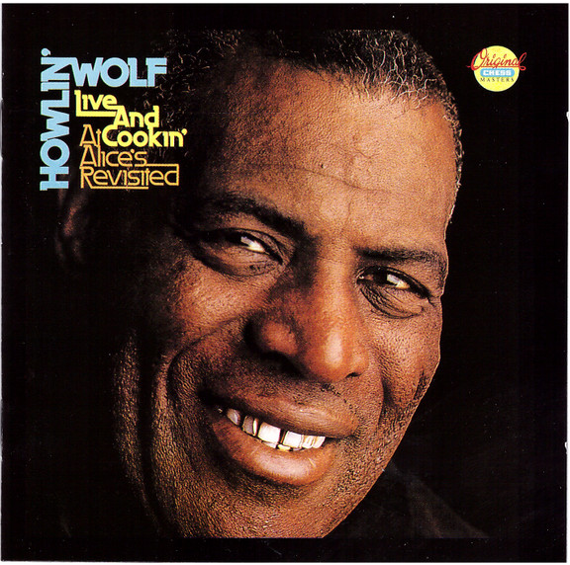Essential Blues Recording
Howlin’ Wolf – Introducing The Wolf To A Hip New Audience
Howlin’ Wolf – Live And Cookin’ (At Alice’s Revisited) – Universal UICY-3438
In his feral prime, Wolf slinked, prowled, and socked his audiences in-performance, and minus any doubt, was one of the most emotional bluesmen to have ever enveloped himself in the blues and bestowed the substance of the music in all its expressive powers. His halcyon forceful stage act, his gripping harmonica playing, spraining guitar toils, haunted vocals, and his pure will to submerge his heeding listeners made Wolf a wonder of nature and the performing arts. He was a musical dynamo, and like his uppermost modern-day blues rival, Muddy Waters, his performing groups were the important proving grounds for an esteemed assortment of exceptional blues aptitudes. Piano artists such as Detroit Junior, Henry Gray, and Johnny Jones dignified his stages, as did venerated guitarists Hubert Sumlin, Jody Williams, Willie Johnson, Big Smokey Smothers, Jimmy Rogers, and Buddy Guy, among others. Chicago saxophone men such as Eddie Shaw and Abb Locke plied great worths with Wolf. Renowned blues drummers including Earl Phillips, Chico Chism, and Sam Lay authenticated the magnitude of percussionists who strove for a slot in Wolf’s bands.
Wolf, the verbatim blues giant of over six feet three inches tall, and all 300 threatening pounds of him, gave the blues world opuses that copied his gigantic physique, and this assemblage, though from Wolf’s later years, exhales vehement fire, passion, and honest exhilaration.
Recorded in late January, 1972 at Alice’s Revisited in Chicago, Illinois, and released in July, 1972 as an eight cut LP on the Chess label (#CH 50015), this is 1996 10-selection re-issue includes the bonus cuts “The Big House” and Mr. Airplane Man.”
In reality, this outing came roughly ten years after Wolf’s greatest stretch of studio blues, and with the Chess label only having one other studio collection still awaiting issuance, Wolf was, at the time, on the downward route of his career. The giant of Chicago blues had already experiences a series of heart attacks prior to this recording, and had appreciably curtailed his in-club Chicago shows due to his ongoing health concerns.
Interestingly, Wolf’s blues, and the blues in general, were rising upward in popularity during the period as an entirely new generation of adoring fans discovered the music. Wolf’s 1971 LP entitled The London Sessions, one that featured some of Britain’s most revered rock artists, had dealt him additional praise and reverence.
Captured here is a club date at Alice’s Revisited, a north side Chicago coffeehouse sort of venue where primarily folk and blues artists played to very accepting audiences. Alice’s Revisited did not serve booze, and the crowds were mostly young hipster types who were just sticking their toes in the blues waters, and by all accounts, greatly loving what they found within this mostly south side genre. The club did much to permanently bring the blues to Chicago’s north side.
Interestingly, on the set memorialized here, Wolf, though performing for an entirely new audience demographic, avoided much of his most well-known songs like “Spoonful” and “Little Red Rooster” in favor of songs that rightfully portrayed his substantial Delta blues background. It was as if he was schooling his spectators on how he came to be “Howlin’ Wolf,” bringing to the forefront through song his influences and traditions he felt compelled to carry forward.
Backed by an all-star blues cast for the show including long-time bandmate and guitarist Hubert Sumlin with Willie Williams also lending support, bass man without peer Dave Myers, piano great Sunnyland Slim, percussionist extraordinaire Fred Below, and bandmate/leader saxophonist Eddie Shaw, Wolf brays like a man possessed and plays spartan harmonica to superb effect. To the youngsters in the crowd, the Howlin’ Wolf experience had to be unlike anything else they’d ever witnessed.
Wolf’s blues were post-war blues cyclonic experiences. Harvest their certainties here.
Highly essential with the greatest deference paid! As Wolf would express, “There’s evil goin’ on” here!
